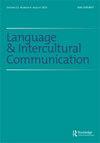陈腐的民族主义与对话的世界主义:网络语言教育在跨文化交流中的潜力
IF 2.2
1区 文学
0 LANGUAGE & LINGUISTICS
引用次数: 1
摘要
本文探讨了以语言为中心的在线教学平台(otp)在促进用户间跨文化交流方面的潜力。通过采访和对两个OTPs网站的分析,我认为OTPs的网页(重新)产生了基于民族语言一致性和工具主义语言意识形态的平庸民族主义,这些意识形态将语言学习视为潜在的社会经济收益。然而,我也发现:(1)学习者的经历会导致他们质疑本质主义的语言意识形态;(2)许多用户信奉会话世界主义的语言意识形态,其前提是与他人进行开放的互动,这与跨文化交际教育者的目标是一致的。本文章由计算机程序翻译,如有差异,请以英文原文为准。
Banal nationalism and conversational cosmopolitanism: the potential of online language education for intercultural communication
ABSTRACT This article considers the potential of language-focused online teaching platforms (OTPs) for fostering intercultural communication among their users. Drawing on interviews alongside an analysis of two OTPs websites, I argue that OTPs' webpages (re)produce banal nationalism grounded in nation-language congruence and instrumentalist language ideologies that conceive of language learning in terms of potential socioeconomic gains. However, I also find that: (1) learners' experiences can result in them questioning essentialist language ideologies; and (2) many users embrace a language ideology of conversational cosmopolitanism, which is premised on open-minded interaction with others and is consistent with the goals of intercultural communication educators.
求助全文
通过发布文献求助,成功后即可免费获取论文全文。
去求助
来源期刊

Language and Intercultural Communication
Multiple-
CiteScore
3.00
自引率
47.40%
发文量
50
期刊介绍:
Language & Intercultural Communication promotes an interdisciplinary understanding of the interplay between language and intercultural communication. It therefore welcomes research into intercultural communication, particularly where it explores the importance of linguistic aspects; and research into language, especially the learning of foreign languages, where it explores the importance of intercultural perspectives. The journal is alert to the implications for education, especially higher education, and for language learning and teaching. It is also receptive to research on the frontiers between languages and cultures, and on the implications of linguistic and intercultural issues for the world of work.
 求助内容:
求助内容: 应助结果提醒方式:
应助结果提醒方式:


